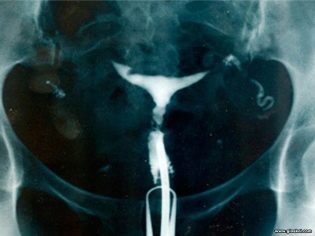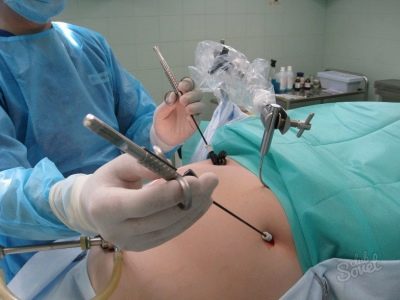What is tubal sterility and how to treat it?
Unfortunately, more and more women are facing the difficulties of conceiving a child. This can be facilitated by various pathologies, including those promoting the development of tubal infertility.
What it is?
Female infertility is a pathology in which, despite all attempts to conceive a baby, a woman does not succeed. Doctors distinguish several clinical variants of infertility. One of them is the so-called tubal infertility. In their practice, doctors use a more precise medical term, which means this condition. This pathology is also called tubal-peritoneal infertility. The pipe factor plays an important role in its development, which determines the origin of this pathological condition.
It should be noted that in the general structure of the incidence of female infertility tubal-peritoneal occurs quite often. Thus, according to statistics, this pathology makes up 30–40% of all cases of infertility in women. Such a high prevalence determines the significance of this pathology. Many scientific studies are conducted annually to help doctors improve the diagnosis and treatment of this disease in women who suffer from it.
Causes of development
In the development of tuboperitoneal infertility, doctors identify several factors that contribute to the occurrence of this pathology. They separate them by origin.
Influence of pipe factor
Speaking of this reason for the development of infertility, doctors imply that a woman has certain pathologies that are associated with the fallopian tubes. Normally, the fallopian tube connects the ovary with the uterus, directly participating in the process of conception. In order for the mature egg to merge with the spermatozoon, it must enter the fallopian tube. And it is along the fallopian tube that the fertilized egg moves into the uterine cavity, where its implantation (tight attachment) to the uterine wall will continue to occur. In this way, Anatomical or functional defects of the fallopian tubes are predisposing factors for the development of tubal infertility.
Many women think that only pathologies lead to the development of tubal infertility, in which the patency of the fallopian tubes is disturbed. In this there is only some truth. Indeed, such pathologies can cause tubal infertility, but are not the only ones. Also, chronic inflammatory diseases of the fallopian tubes, which are accompanied by persistent and prolonged inflammation that occurs in the uterine appendage, can lead to the development of tubal infertility.
It is worth noting that during inflammation the full physiological functioning of the organ is impaired. This contributes to the fact that the fallopian tube begins to peristalize less. In such a situation, the movement of the mature egg to conceive occurs rather slowly.
Spermatozoa, being in an unfavorable environment for them, retain their viability only for a few days.If the egg moves too slowly through the fallopian tube, then the possibility of natural fertilization is almost zero. As a result, this contributes to the fact that a woman who suffers from a chronic inflammatory disease of the uterine tube (salpingitis) can face the problem of tubal infertility.
The development of infertility of the fallopian tubes caused by adhesions can lead to a variety of infections, including those that are sexually transmitted. Such diseases include, for example, chlamydia or gonorrhea.
The reasons contributing to the development of secondary pathologies leading to infertility are also intrauterine gynecological interventions. These include the following:
- scraping, carried out for a variety of reasons both for medical and diagnostic purposes;
- abortion with the use of medical instruments;
- hydrotubation of uterine tubes.
Endometriosis can also lead to the development of tubal infertility. Unfortunately, this dangerous pathology has become increasingly common in gynecological practice. Endometriosis disrupts the full functioning of the fallopian tubes, which also helps reduce the likelihood of self-conception of the baby.
The influence of peritoneal factor
The adhesions process, as a result of which various adhesions appear (outgrowths), can develop in the female body almost anywhere. An exception is not the cavity of the pelvis. The presence of adhesions in the pelvis and the abdominal cavity in women can be considered as the peritoneal factor of tuboperitoneal infertility. It should be noted that adhesions may form in different places. So, they can be localized in the area of the bladder, behind the uterus, in the area of the ovaries and fallopian tubes. The adhesions, as if “strands,” begin to stretch the organ in different directions. This leads to the fact that the organ affected by the adhesive process simply cannot fully function.
The presence of adhesions inside the fallopian tube is a separate pathology. In this case, the mature eggs, which are produced by healthy ovaries, also have virtually no chance of meeting with sperm. Adhesions that are present in the fallopian tube, are a mechanical obstacle to the movement of the egg. In this case, the probability of natural conception is also significantly reduced.
The development of adhesions in the pelvis in women may be due to various reasons. Among them are the consequences of gynecological and surgical operations.
The presence of previous operations in the history should be a warning sign for the doctor. In this situation, an extended diagnosis is required, including aimed at identifying adhesions in the pelvis.
How does it manifest itself?
The danger of tubal infertility in many ways lies in the fact that a woman for a long time may not be aware that she has a big problem with the natural conception of a baby. Even with chronic diseases of the fallopian tubes, tube infertility does not always develop. As a rule, for the first time to think about the possible presence of tubal-peritoneal infertility make unsuccessful attempts of a couple to conceive a baby.
In the overwhelming number of cases, women of reproductive age come to an appointment with a fertility specialist or gynecologist, who, despite repeated attempts to conceive a baby, cannot do so. To determine the pathology that caused this condition, doctors resort to the appointment of a number of diagnostic procedures, including for a number of indications, including the examination of the tubal patency. After such a diagnosis, doctors can understand the exact cause that influenced the development of tubal-peritoneal infertility in each specific situation.
Treatment
Therapy for tubal infertility is always complex and rather complicated.Before treatment, a woman should have courage and patience. Sometimes it happens that to achieve a positive result requires a lot of time, effort and even financial costs. If doctors determine that the cause leading to tubal-peritoneal infertility can be managed with the help of complex therapy, then they will definitely talk about this to the patient. A positive attitude towards treatment is one of the important components of success.
Drug therapy
Treatment with medication is usually carried out if a woman suffering from tubal infertility has some chronic inflammatory diseases of the fallopian tubes. A number of drugs fights against inflammation, thereby reducing adverse effects. The choice of treatment tactics largely depends on the specific pathology that caused the development of tubal infertility. So, for the purpose of therapy, a woman who dreams of becoming a mother can be prescribed anti-inflammatory drugs. They are usually assigned to the course admission. In this case, the doctor must indicate a single dosage and the number of days of admission. It is determined individually.
If the cause of the inflammatory process in the fallopian tubes is an infection, then the prescription of antibacterial drugs is required. Currently, doctors prefer modern antibiotics, which have a wide spectrum of action. The advantages of the appointment of such funds are obvious. Antibiotics with a wide spectrum of action, can effectively deal with a wide variety of pathogenic (pathogenic) microbes. Modern antibacterial drugs are usually well tolerated. They are also assigned to the exchange reception.
After conducting antibiotic therapy, an evaluation of its effectiveness is necessarily carried out. For this woman can be assigned to blood tests, as well as the conduct of the collection of smears from the genital tract. If the antibiotic therapy is recognized as ineffective, then another antibiotic is selected with an alternative regimen.
In the treatment of infectious pathologies can be used various drugs. So, some of them are written out for oral administration - in the form of capsules, powders or tablets. Others are injected through injections.
The choice of the method of administration of the drug depends on its chemical properties. The way of managing the drug is chosen by the attending physician.
Physiotherapy
For the treatment of tuboperitoneal infertility a wide variety of physiotherapeutic methods can be used. One of them is the appointment of electrophoresis with drugs that have anti-inflammatory and resorbing action. To achieve a positive effect, several procedures are usually required.
The frequency of visits and the number of treatment sessions are determined by the attending physician together with the physiotherapist. For each physiotherapy technique, there are a number of contraindications, so they are appointed only by specialists.
Gynecological surgery
In some cases, to eliminate the cause that led to the development of tubal infertility, surgery is required. The operation in this case should be aimed at improving the situation, and should also contribute to improving the possibility of natural conception. After a surgical gynecological intervention on the fallopian tubes, a woman may be prescribed a maintenance complex of drug therapy, as well as, if necessary, physical therapy.
Assisted Reproductive Technologies
Unfortunately, in practice, quite often there are cases when, after a long and sometimes debilitating treatment of a positive therapeutic effect, doctors still cannot be reached.In this case, the help of a woman who wants to feel the beauty of motherhood comes from modern medical technologies, one of which is in vitro fertilization (IVF).
Before IVF, a woman who plans to conceive a baby soon needs some training. For this, doctors prescribe a future mother for a set of examinations, and, if necessary, select a treatment scheme. This is necessary for the fact that she was able to carry the baby during pregnancy.
Before IVF, the treatment of concomitant diseases is also mandatory, as the exacerbation of such pathologies during pregnancy can significantly worsen the prognosis.
About what pipe infertility, see the following video.


























